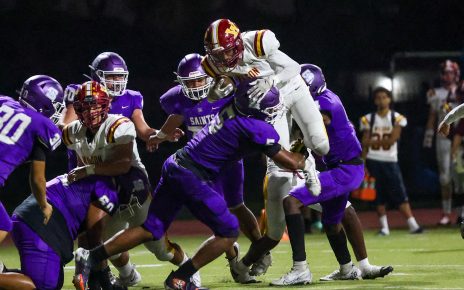The California Community College Athletic Association (CCCAA) announced late last week that its Board of Directors had approved its Contingency Plan for fall sports, pushing all sports, including football, to the Spring of 2021. This directly impacts the athletic programs at Long Beach City College, which will not be able to begin official practices until January 18, 2021.
“I know I speak for the entire CCCAA Board that moving Fall athletics to Spring 2021 is a huge disappointment,” said Board Chair and President of Pasadena City College, Dr. Erika Endrijonas, in a statement. “However, the need to keep our student-athletes and the amazing coaches and athletic trainers who work with them safe was simply the only option available with the virus spiraling out of control across the state.”
The Contingency Plan was one of three plans adopted by the CCCAA Board of Directors back in June, and it was the most restrictive of the plans laid out and unanimously approved.
“The health and safety of our student-athletes, coaches and staffs are our top priorities,” added Interim Executive Director Jennifer Cardone in the CCCAA’s statement. “While the Contingency Plan has the most drastic changes, it’s also the one that provides us the best opportunity to return to competition.”
“Our first and foremost job is to keep our athletes in a good place,” said Long Beach City College Interim Athletic Director Bill Husak. “This is certainly a unique circumstance and we’re all in the same boat here. But what people sometimes fail to realize is the impact that not being able to play a sport has on a young person who has played sports for most of their lives. My hope is we can get classes in place, that the virus diminishes enough where we can have hybrid classes and still be able to see students face-to-face, and we can keep student athletes engaged, not just in athletics but in the classroom as well.”
Junior college sports will now be broken up into “Early Spring” sports, beginning practices on January 18, 2021, and “Late Spring” sports, which are set to begin practicing on March 27, 2021. The majority of the Early Spring sports–including basketball, soccer, women’s volleyball and others–will start competition on February 5, 2021, while football’s competition start date will be on February 13. All sports will be permitted to play just 70 percent of their usual allotment of games during the 2020-21 season, meaning there will be a maximum of seven football games played per team, rather than 10.
Late Spring sports–including baseball, tennis, track, men’s volleyball and others–will begin playing official contests on April 10. With such a condensed schedule, Husak says there will be difficulties in the year ahead as schools attempt to play two seasons in such close proximity.
“There will be great logistical challenges,” Husak admitted. “Even at 70 percent of the season, we’re going to have to do all 70 percent in one semester. We have training room concerns, equipment and staffing concerns, all of our support people are going to be strapped as well. It’s monumental.”
Delaying football creates some sport-specific concerns, since players usually benefit from an extensive offseason conditioning program. If players remain quarantined until the start of 2021 without proper conditioning, Vikings head coach Brett Peabody fears that could create some health risks in such a physically demanding sport.
“I’m hoping to get to practice in the fall and get them ready to physically compete,” Peabody said. “I have very serious safety concerns that we could be off since March, when we were shut down, then be unable to condition all fall and somehow have these kids healthy enough to compete in any sport. That goes for multiple sports, not just football. So hopefully at some point the county and the city health department will allow us to at least do some conditioning in small groups.”
Peabody praised the CCCAA for providing open, consistent communications with member institutions, making this an unsurprising decision for coaches and administrators. Though the decision came a week before the CCCAA’s self-imposed deadline on a fall sports plan, it does offer colleges additional time to prepare for a challenging year.
“I’m glad the decision was made sooner than later, but there’s a whole bunch of factors in addition to the conditioning component that need to be factored in,” Peabody explained. “Between eligibility, the state, the NCAA, there’s a lot of layers to unpeel. I’m also very concerned about the psychological impact this has had on all student-athletes, and any person who has children going to school.”
One major hurdle revolves around recruitment of student-athletes. Under the Contingency Plan, the football season is scheduled to start 10 days after National Signing Day, which falls on February 3, 2021. If that date isn’t pushed back by the NCAA, players will be unable to showcase their talents and earn scholarships in the season ahead. That could drive players away from the sport, or even to other states that may opt to play in the fall.
“Our state governing body, they did some great stuff with the student-athletes who lost their season in the spring,” Peabody said. “I’m confident that the CCCAA will come up with something that’s fair and equitable to the student-athletes. My concern is how the communication goes between our governing body and the NCAA. Because at the end of the day, that’s who has the final say on whether or not our student-athletes will be eligible.”





